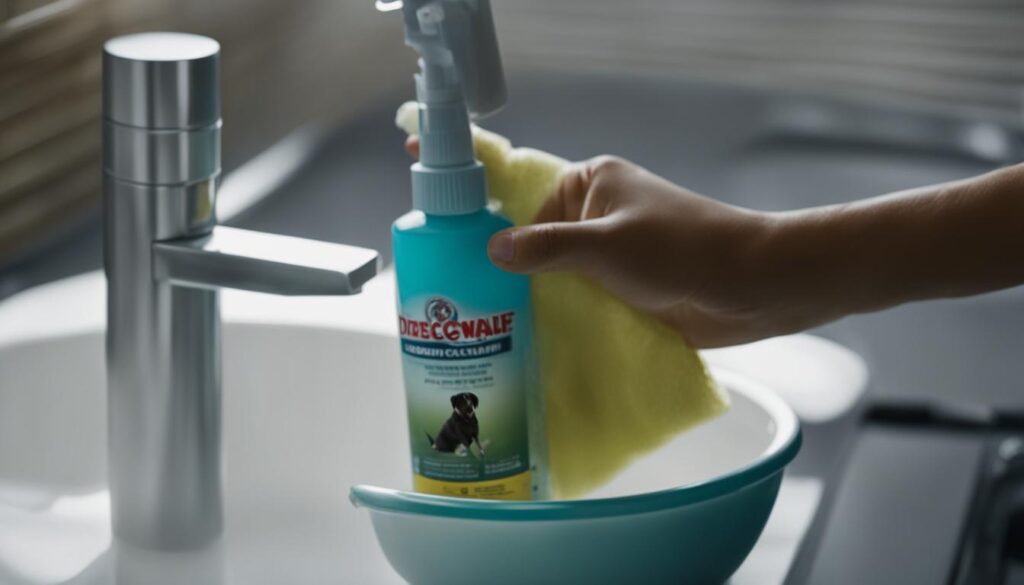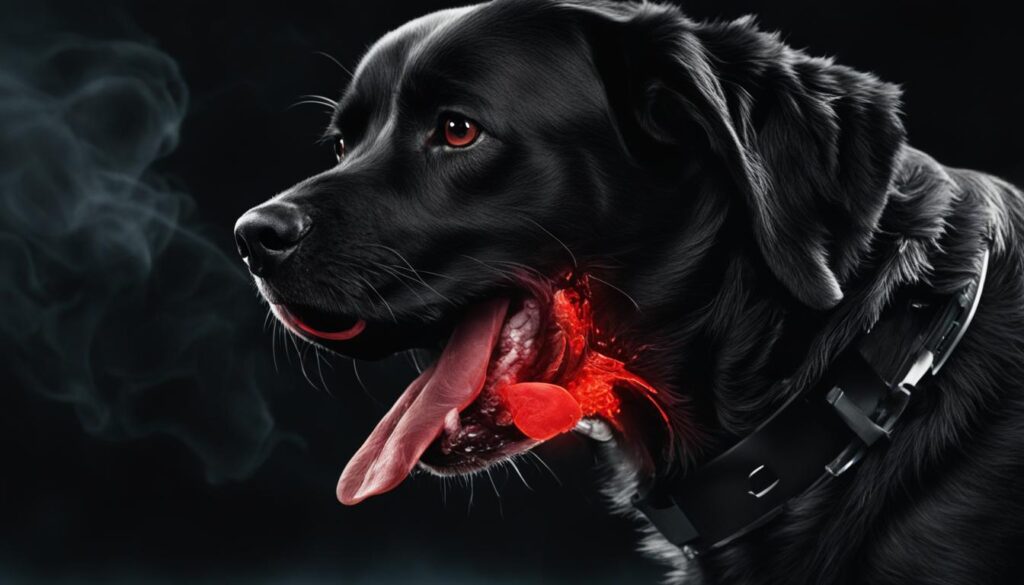As a dog owner, it’s important to be aware of common respiratory infections that can affect our canine companions. One such infection is Bordetella, also known as kennel cough. Bordetella is caused by a bacteria called Bordetella bronchiseptica and is highly contagious among dogs. Understanding the causes and prevention of Bordetella is crucial for maintaining the health and well-being of our furry friends.
Bordetella is primarily transmitted through close contact with infected dogs. Places like kennels, dog shows, doggy daycares, and dog parks where dogs come into contact with each other are high-risk areas. The bacteria can spread through aerosolized spray, such as coughing or sneezing, from infected dogs. Other bacteria can also invade the respiratory tract, leading to complications like pneumonia.
Vaccination plays a vital role in preventing the spread of Bordetella. By keeping our dogs up to date with their vaccinations, we can help protect them from this contagious respiratory disease. Treatment for Bordetella typically involves antibiotics and rest to promote recovery. It’s essential to consult a veterinarian if your dog displays symptoms like a persistent dry cough, gagging, runny nose, or sneezing.
Key Takeaways:
- Bordetella, also known as kennel cough, is a highly contagious respiratory infection.
- The bacteria Bordetella bronchiseptica causes this infection in dogs.
- Transmission occurs through close contact and aerosolized spray from infected dogs.
- Vaccination is essential to prevent the spread of Bordetella.
- Treatment involves antibiotics and rest, but veterinary consultation is crucial.
Causes and Transmission of Bordetella in Dogs

Bordetella in dogs is primarily caused by the bacteria Bordetella bronchiseptica. This pathogen is responsible for the highly contagious respiratory infection commonly known as kennel cough. Dogs can contract Bordetella through close contact with infected individuals, making environments like crowded kennels, boarding facilities, dog parks, and grooming salons potential hotspots for transmission. The bacteria can be spread through respiratory secretions or by coming into contact with contaminated objects like water bowls and toys.
Any breed, age, or sex of dog can be at risk of Bordetella infection. However, unvaccinated pets, puppies, and senior dogs are more susceptible to severe forms of the disease. The bacteria can easily spread in crowded or poorly ventilated areas, where dogs are more likely to come into close proximity with infected individuals.
Transmission of Bordetella
The primary mode of transmission for Bordetella is through respiratory droplets. When an infected dog coughs, sneezes, or even barks, small droplets containing the bacteria are released into the air. These droplets can be inhaled by other dogs in close proximity, facilitating the spread of the infection.
In addition to airborne transmission, Bordetella can also be passed through direct contact with infected dogs. This can occur through sniffing, licking, or sharing water bowls and toys contaminated with the bacteria.
Preventive Measures
To prevent the spread of Bordetella and protect your dog from infection, vaccination is crucial. Vaccines are available to help strengthen the immune system and reduce the severity of symptoms in case of exposure to the bacteria. Regular vaccination is especially important for dogs that are frequently exposed to other dogs, such as those who regularly visit boarding facilities or participate in dog shows.
Moreover, avoiding exposure to crowded or poorly ventilated areas can further minimize the risk of Bordetella transmission. Dog owners should also practice good hygiene by regularly cleaning and disinfecting their dog’s belongings, such as bowls, toys, and bedding.
By taking these preventive measures, dog owners can help protect their pets from Bordetella infection and contribute to creating a safer environment for all dogs.
Symptoms of Bordetella in Dogs

When it comes to identifying Bordetella in dogs, it’s essential to recognize the telltale symptoms. The most common sign is a persistent dry cough, often referred to as kennel cough. This cough is typically loud and harsh, as the dog’s lungs attempt to clear phlegm. Other symptoms may include gagging, hacking, watery or runny nose, sneezing, and nasal or eye discharge. It’s important to note that some infected dogs may be asymptomatic, showing no visible signs of infection.
If your dog develops a persistent cough or exhibits any of these symptoms, it is crucial to seek veterinary care promptly. Early intervention can help prevent the spread of Bordetella and ensure your dog receives the necessary treatment.
Recognizing the Symptoms
- Persistent dry cough
- Gagging
- Hacking
- Watery or runny nose
- Sneezing
- Nasal or eye discharge
Treatment for Bordetella in Dogs
When it comes to treating Bordetella in dogs, the primary approach involves a combination of antibiotics and rest. The antibiotics are used to combat the bacterial infection caused by Bordetella bronchiseptica, while rest allows the dog’s immune system to recover and fight off the infection.
It’s important to note that cough suppressants should not be administered to dogs with Bordetella, as coughing actually helps clear the throat and remove excess mucus. Instead, focus on providing a calm and stress-free environment for your canine companion to ensure a speedy recovery.
If your dog has been diagnosed with Bordetella, it is crucial to consult a veterinarian for proper treatment. They will prescribe the appropriate antibiotics based on the severity of the infection and the dog’s individual health needs. It’s important to follow their instructions and complete the full course of antibiotics, even if your dog starts showing signs of improvement.
In severe cases where the infection has progressed to pneumonia, hospitalization and additional supportive care may be required. The veterinarian will closely monitor your dog’s condition and provide the necessary treatments, such as oxygen therapy or intravenous fluids, to ensure a full recovery.
Always remember to avoid administering human cough medicine to dogs, as it can be harmful to their health. Stick to the prescribed medications and follow the veterinarian’s advice for the best outcomes.
The Importance of Rest
Rest plays a crucial role in the treatment of Bordetella in dogs. It allows the body to redirect its energy towards fighting off the infection, promoting a faster recovery. During this time, it’s important to limit your dog’s physical activity and avoid exposing them to stressful situations that may worsen their symptoms.
Creating a comfortable and quiet space for your dog to rest is essential. Provide a cozy bed in a quiet room away from noise and disturbances. Make sure your dog has access to fresh water and a well-balanced diet to support their immune system during the recovery period.
By following the veterinarian’s recommendations for antibiotics and providing adequate rest, you can help your dog overcome Bordetella and return to their happy and healthy self in no time.
Prevention of Bordetella in Dogs

The best way to prevent kennel cough, also known as Bordetella, in dogs is through vaccination. Vaccines for Bordetella are available in different forms, including skin injections, nasal administration, and oral administration. It is important to discuss with your veterinarian to determine the most suitable vaccination method for your dog.
The American Animal Hospital Association provides guidelines for the vaccination schedule. After the initial dose, dogs should receive a booster injection once a year to maintain protection against Bordetella.
Vaccination plays a crucial role in preventing kennel cough and reducing the risk of infection. By vaccinating your dog, you not only protect them but also contribute to the overall community health by minimizing the spread of Bordetella.
Vaccination Methods for Bordetella
- Skin Injections: These vaccines are administered through subcutaneous injections, typically on the back of the neck. The injection delivers a dose of the vaccine to stimulate the dog’s immune system.
- Nasal Administration: Nasal vaccines are sprayed into the dog’s nostrils. The vaccine is inhaled and absorbed by the respiratory system, providing local immunity against Bordetella.
- Oral Administration: Oral vaccines come in the form of tablets or liquids that are administered by mouth. These vaccines stimulate the immune system of the dog’s gastrointestinal tract to provide protection against Bordetella.
Regular vaccination is essential to ensure your dog’s protection against Bordetella. It is recommended to follow the vaccination schedule provided by your veterinarian and keep your dog’s vaccination status up to date. Prevention is key to maintaining your dog’s health and reducing the risk of kennel cough.
Transmission and Hygiene Practices for Bordetella

Bordetella, also known as kennel cough, can easily spread from one dog to another through respiratory secretions or contaminated objects. It is crucial to understand the transmission methods and adopt proper hygiene practices to prevent the spread of this infectious disease.
When an infected dog coughs or sneezes, respiratory secretions containing Bordetella bacteria are released into the air. Other dogs in close proximity can inhale these aerosolized particles, leading to infection. Indirect transmission can occur when healthy dogs come into contact with contaminated objects like water bowls, toys, or surfaces.
To minimize the transmission of Bordetella:
- Isolate infected dogs: Infected dogs should be kept away from other dogs to prevent the spread of Bordetella. This includes avoiding places like kennels, dog parks, and grooming salons until the dog has completely recovered.
- Practice good hygiene: Regularly disinfect water bowls and toys to eliminate any potential contamination. Use appropriate disinfectants that are effective against Bordetella and follow the instructions for proper usage.
- Clean hands and clothing: Humans can unknowingly spread Bordetella to other dogs. It is essential to wash hands thoroughly with soap and water after handling an infected dog. Changing clothes or wearing protective clothing while interacting with infected dogs can also help reduce the risk of transmission.
By implementing these hygiene practices, dog owners and caregivers can play a significant role in preventing the transmission of Bordetella and safeguarding the well-being of their furry companions.
Example of a Disinfection Routine:
| Object | Recommended Disinfection Frequency |
|---|---|
| Water Bowls | At least once a day |
| Toys | After each use, especially if shared among dogs |
| Surfaces | Regularly, using appropriate disinfectants |
Implementing proper hygiene practices is an essential component of preventing the spread of Bordetella. By taking these precautions and maintaining a clean environment, we can create a safer and healthier space for our canine companions.
Canine Infectious Respiratory Disease Complex (CRD)

Canine infectious respiratory disease (CRD) is a complex infection that involves Bordetella and other bacteria or viruses. This condition is more commonly observed in dogs older than 6 months and can result in more severe respiratory complications.
Dogs affected by CRD may exhibit various symptoms, including a persistent and severe cough, pneumonia, fever, lethargy, decreased appetite, sneezing, and eye discharge.
Quote: “CRD is a serious respiratory infection that requires prompt veterinary care to treat complications and prevent further spread of the disease.” – Dr. Emily Thompson, Veterinarian
CRD can be challenging to manage due to the involvement of multiple infectious agents. The primary aim of treatment is to alleviate symptoms and enhance the dog’s immune response. Antibiotics are commonly prescribed to combat bacterial infections, while antiviral medications may be recommended for viral components. Supportive care, such as fluids and rest, may also be provided to aid in recovery.
Complications of Bordetella Infection
Bordetella infection, which is a significant contributor to CRD, can lead to various complications in affected dogs. These complications may include:
- Pneumonia: In severe cases, the bacterial infection can spread to the lungs, resulting in pneumonia. This can cause further respiratory distress and may require additional treatment and hospitalization.
- Secondary Infections: Bordetella can weaken the dog’s respiratory system, making it more susceptible to other bacterial or viral infections.
- Reduced Immunity: The immune system may become compromised as a result of CRD, making the dog vulnerable to other illnesses.
Early detection and treatment of Bordetella infections can help minimize the risk of complications and improve the dog’s prognosis.
| Complications of Bordetella Infection | Description |
|---|---|
| Pneumonia | In severe cases, the infection can spread to the lungs, resulting in potentially life-threatening pneumonia. |
| Secondary Infections | Bordetella infection weakens the respiratory system, making dogs susceptible to additional bacterial or viral infections. |
| Reduced Immunity | Chronic or severe CRD can compromise the immune system, leaving dogs more susceptible to other illnesses. |
It is crucial for dog owners to remain vigilant for any signs of respiratory distress or complications related to Bordetella infection. Seeking veterinary care promptly can help prevent the progression of CRD and improve the dog’s chances of a successful recovery.
Financial Options for Bordetella Treatment

Treatment for Bordetella, especially in severe cases or when complications arise, can result in high veterinary bills. Fortunately, there are financial options available to help pet owners manage the cost of treatment.
Pet Insurance for Bordetella
One option is to invest in pet insurance, which can provide coverage for the expenses associated with Bordetella treatment. Companies like Trupanion Express offer comprehensive pet insurance plans that can help alleviate the financial burden of veterinary bills. With pet insurance, you can have peace of mind knowing that your furry friend’s healthcare needs are taken care of.
Pet Health Savings Accounts
Another option is to open a pet health savings account. Similar to a regular savings account, a pet health savings account allows you to set aside money specifically for your pet’s medical expenses. By depositing funds into this account regularly, you can build a financial cushion to cover the costs of Bordetella treatment and other veterinary services.
Payment Methods
Financial institutions, such as Care Credit and Scratch Pay, offer payment methods specifically designed for veterinary expenses. These options allow you to pay for your pet’s treatment in manageable installments, easing the financial strain. By spreading out the cost over time, you can ensure that your dog receives the necessary care without putting a strain on your budget.
When considering your financial options for Bordetella treatment, it’s essential to explore all possibilities and choose the one that best fits your needs and budget. Your furry friend’s health should always be a priority, and having the right financial support can make it easier to provide them with the care they deserve.
| Financial Options | Features |
|---|---|
| Pet Insurance | – Coverage for Bordetella treatment – Reimbursement for veterinary expenses – Peace of mind |
| Pet Health Savings Accounts | – Set aside funds for medical expenses – Control over your pet’s healthcare budget – Flexibility |
| Payment Methods | – Manageable installments – Eases immediate financial burden – Access to necessary treatment |
Importance of Regular Vaccination and Preventive Care
Regular vaccination is critical for protecting dogs against Bordetella and other respiratory infections. Vaccines not only help prevent the spread of diseases but also enhance the dog’s overall health and immune response.
When it comes to Bordetella, regular vaccination is the key to keeping your furry friend safe. Vaccines are designed to stimulate the dog’s immune system, preparing it to fight off infection. By receiving regular vaccinations, dogs develop antibodies that can combat Bordetella and prevent it from causing illness.
In addition to vaccination, preventive care plays a vital role in keeping dogs healthy and reducing the risk of infections. Providing a balanced diet that meets their nutritional needs helps support their immune system, keeping them strong and better equipped to fend off diseases.
“Regular vaccination is an essential part of preventive care for dogs. It helps protect them from a range of diseases, including Bordetella. By keeping your dog’s vaccinations up to date, you are taking proactive steps to ensure their well-being and longevity.”
Regular exercise is another important aspect of preventive care. Physical activity not only keeps dogs physically fit but also helps boost their immune system. A well-exercised dog is generally healthier and less susceptible to infections, including Bordetella.
Proper veterinary care is crucial in maintaining a dog’s well-being. Regular check-ups and preventive screenings allow veterinarians to detect any potential health issues early on, making it easier to address them before they become serious problems.
Preventive Care Checklist for Dogs:
Here’s a checklist of essential preventive care measures to keep your dog in top shape:
- Schedule and maintain regular vaccinations to protect against Bordetella and other diseases.
- Provide a balanced diet that meets your dog’s nutritional needs.
- Engage your dog in regular exercise to keep them physically fit.
- Ensure proper dental care, including regular brushing and professional cleanings.
- Regularly check for parasites like fleas and ticks, and use preventive treatments as recommended by your veterinarian.
- Keep vaccinations up to date, including boosters and annual shots.
- Monitor your dog’s behavior and overall health, and seek veterinary care if you notice any changes or concerns.
By following these preventive care measures and maintaining regular vaccinations for Bordetella, you can greatly reduce the risk of infections and ensure your dog remains happy and healthy for years to come.
Canine Influenza and Bordetella
Canine influenza (CIV) is another viral component of kennel cough and can contribute to the infectious respiratory disease complex. Similar to kennel cough, canine influenza is highly contagious and can spread easily among dogs through respiratory secretions and contaminated objects. The two common subtypes of the Canine influenza virus are H3N8 and H3N2.
Symptoms of canine influenza include coughing, sneezing, nasal discharge, and lethargy, which are also typical signs of kennel cough. The severity of the symptoms can vary from mild to severe, and in some cases, it can lead to pneumonia.
To prevent and protect dogs from canine influenza, vaccines are available for both subtypes of the virus. Vaccination is an essential preventive measure, especially for dogs that are frequently exposed to other dogs, such as those in kennels, grooming salons, or doggy daycare. Regular vaccination helps reduce the risk of infection and minimize the spread of the virus among the canine population. Consulting with a veterinarian is crucial to determine the appropriate vaccination schedule and to discuss the best options for your dog’s specific needs.
As responsible dog owners, it is important to stay informed about the threats posed by canine influenza and take necessary precautions to safeguard our furry friends. Vaccination, along with practicing good hygiene and minimizing close contact with infected dogs, can help protect our canine companions from this infectious respiratory disease.
Did You Know?
- Canine influenza can be spread not only among dogs but also to other animals, such as cats and horses.
- The Canine influenza virus can survive on surfaces for up to 48 hours, making it important to disinfect and clean objects that may come into contact with infected dogs.
- If your dog exhibits symptoms of canine influenza, it is best to isolate them from other dogs to prevent further spread of the virus.
Breed and Anatomical Factors in Bordetella Infection
While any dog can contract Bordetella, certain breeds may be more susceptible to developing symptoms due to their anatomical characteristics. Dogs with short or flat noses, such as French Bulldogs, Pugs, and Boxers, have a higher risk of experiencing severe clinical signs from Bordetella infection. These breeds have anatomical features that make them more prone to respiratory issues. Pet owners of these breeds should be particularly cautious and ensure their dogs receive proper preventive care.
Common Breeds Prone to Bordetella Infection:
| Breed | Description |
|---|---|
| French Bulldog | French Bulldogs have a short and pushed-in muzzle, which can lead to respiratory problems. |
| Pug | Pugs also have a flat face and compact airways, making them more susceptible to respiratory issues. |
| Boxer | Boxers have a short snout, increasing their risk of respiratory infections. |
It is important for owners of these breeds to be aware of the potential risks and take appropriate measures to prevent Bordetella infection. Providing regular veterinary care, including vaccination, and avoiding environments where the disease is prevalent can help reduce the chances of infection. Additionally, practicing good hygiene, such as regularly cleaning and disinfecting toys and bowls, can further minimize the risk of transmission.
Wrapping Up
In conclusion, Bordetella, also known as kennel cough, is a highly contagious respiratory infection in dogs caused by the bacteria Bordetella bronchiseptica. This infection can spread easily in environments where dogs come into close proximity, such as kennels, boarding facilities, and dog parks. Therefore, it is crucial to take preventive measures to reduce the risk of infection and protect our furry friends.
Vaccination is the key preventive measure for Bordetella. By ensuring that dogs receive their vaccinations, we can minimize the spread of the bacteria and reduce the likelihood of infection. Additionally, prompt veterinary care is essential if any symptoms of kennel cough develop in a dog. Seeking medical attention at the first sign of infection can help prevent the disease from progressing to more severe complications.
Practicing good hygiene and maintaining regular preventive care for dogs are also important. By keeping doggy areas clean, disinfecting toys and bowls, and washing hands after contact with dogs, we can help minimize the spread of Bordetella. Regular wellness exams and preventive care visits to the veterinarian will also contribute to the overall health and well-being of our canine companions.
In conclusion, by taking proactive measures such as vaccination, prompt medical care, and good hygiene practices, we can effectively combat and prevent the spread of Bordetella, ensuring that our dogs stay healthy and happy.
FAQ
What causes Bordetella in dogs?
Bordetella in dogs is primarily caused by the bacteria Bordetella bronchiseptica. It can be transmitted through close contact with infected dogs, such as in crowded kennels, boarding facilities, dog parks, and grooming salons.
What are the symptoms of Bordetella in dogs?
The most common sign of Bordetella in dogs is a persistent dry cough, often referred to as kennel cough. Other symptoms may include gagging, hacking, watery or runny nose, sneezing, and nasal or eye discharge.
How is Bordetella in dogs treated?
Treatment for Bordetella in dogs usually involves antibiotics to combat the bacterial infection. Rest and minimal exercise are recommended to allow the dog to recover. It is important to consult a veterinarian for proper treatment and not to administer human cough medicine to dogs.
How can Bordetella in dogs be prevented?
The best way to prevent Bordetella in dogs is through vaccination. There are different types of Bordetella vaccines available, including skin injections, nasal administration, and oral administration. It is important to discuss vaccination options with your veterinarian to determine the most suitable method for your dog.
How does Bordetella spread and what hygiene practices can be followed?
Bordetella can easily spread from one dog to another through respiratory secretions or contaminated objects. To prevent transmission, infected dogs should be kept away from other dogs. Practicing good hygiene, such as disinfecting water bowls, toys, and hands, can help prevent the spread of the bacteria.
What is Canine Infectious Respiratory Disease Complex (CRD)?
Canine infectious respiratory disease (CRD) refers to a complex infection involving Bordetella and other bacteria or viruses. It commonly occurs in dogs older than 6 months and can lead to more severe respiratory complications.
Are there financial options for Bordetella treatment?
Treatment for Bordetella, especially in severe cases or when complications arise, can result in high veterinary bills. Pet insurance plans like Trupanion Express can help cover the costs associated with the treatment. Additionally, financial institutions may offer pet health savings accounts or payment methods like Care Credit and Scratch Pay to help manage veterinary expenses.
How important is regular vaccination and preventive care?
Regular vaccination is critical for protecting dogs against Bordetella and other respiratory infections. In addition to vaccination, providing a balanced diet, regular exercise, proper veterinary care, and keeping vaccinations up to date are essential for maintaining a dog’s well-being and minimizing the risk of infections.
Is canine influenza related to Bordetella?
Canine influenza (CIV) is another viral component of kennel cough and can contribute to the infectious respiratory disease complex. There are two common subtypes of the Canine influenza virus: H3N8 and H3N2. Vaccines are available for both subtypes of canine influenza.
Are certain dog breeds more susceptible to Bordetella?
While any dog can contract Bordetella, certain breeds may be more susceptible to developing symptoms due to their anatomical characteristics. Dogs with short or flat noses, such as French Bulldogs, Pugs, and Boxers, have a higher risk of experiencing severe clinical signs from Bordetella infection.
Wrapping Up
Bordetella, or kennel cough, is a highly contagious respiratory infection in dogs caused by the bacteria Bordetella bronchiseptica. It spreads easily among dogs in close proximity, such as in kennels, boarding facilities, and dog parks. Vaccination is an essential preventive measure to reduce the risk of infection, and prompt veterinary care is necessary if symptoms occur. Practicing good hygiene and maintaining regular preventive care for dogs can help minimize the spread of Bordetella and keep our canine companions healthy.






